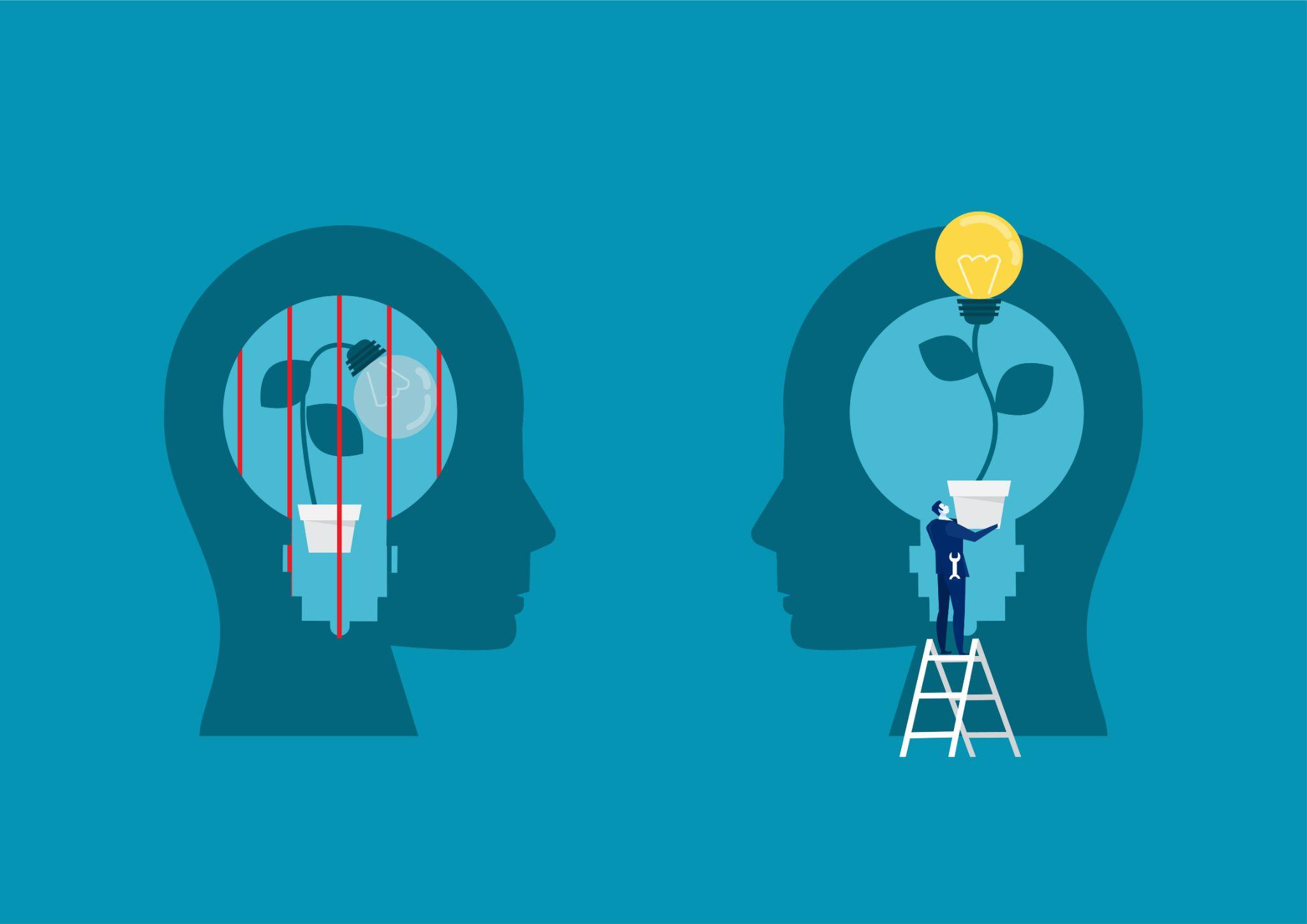Your mindset can be the most powerful tool in your recovery—or your biggest obstacle. Which mindset are you choosing?
In addiction recovery, your perspective matters. The way you view challenges, setbacks, and your ability to improve can shape your journey. Psychologist Carol Dweck introduced us to the concepts of the growth mindset vs. fixed mindset.
A growth mindset focuses on the belief that progress is possible and that abilities can be developed over time. A fixed mindset, on the other hand, keeps you stuck, believing that change is impossible.
By understanding the difference between growth and fixed mindsets, you can empower yourself to step outside your comfort zone, embrace challenges, and see recovery as a process of continual growth.
A Fixed Mindset in Addiction Recovery
A fixed mindset is the belief that your qualities, abilities, and circumstances are unchangeable. It leads to thoughts like:
- “I’ll always be an addict.”
- “I can’t change, so why try?”
- “Recovery is too hard for me.”
Common Characteristics of a Fixed Mindset
- Avoiding challenges. People with a fixed mindset avoid stepping outside their comfort zone for fear of failure.
- Feeling helpless or stuck. They see obstacles as permanent barriers instead of temporary hurdles.
- Viewing relapse as failure. Setbacks reinforce negative beliefs that recovery isn’t possible.
Impact on Recovery
A fixed mindset can sabotage your progress. When you believe you’re incapable of change, you resist the efforts required to heal. Relapses are seen as confirmation of failure rather than opportunities to learn.
For example, someone with a fixed mindset might think, “I relapsed, so I’ll never get better.” This kind of thinking creates hopelessness and prevents individuals from seeking help or engaging fully in therapy.
Without growth, the cycle of addiction often continues, reinforcing self-doubt and shame.
What Is a Growth Mindset and Why Is It Vital in Recovery?
A growth mindset is the belief that you can learn, improve, and grow through effort and persistence. This perspective shifts your focus from what you can’t do to what you can work toward.
Carol Dweck’s research shows that people with a growth mindset believe abilities can be developed with time and practice.1 In addiction recovery, this belief is essential for progress.
Core Principles of a Growth Mindset
- Belief in change. You recognize that growth is possible, no matter where you are starting from.
- Effort is meaningful. Hard work and persistence lead to results over time.
- Mistakes are learning opportunities. Instead of fearing failure, you see it as a chance to grow.
Why a Growth Mindset Is Essential for Recovery
- Encourages persistence. When recovery feels difficult, a growth mindset helps you keep going.
- Builds resilience. Setbacks are not failures—they are chances to adapt and strengthen your recovery plan.
- Promotes long-term healing. By believing you can improve, you commit to the process of recovery and embrace challenges as part of your journey.
For someone in recovery, adopting a growth mindset means stepping outside of your comfort zone, pushing past self-doubt, and recognizing your potential for change.
Scientific Backing: Why Mindset Matters
The importance of mindset isn’t just an idea—it’s grounded in science.
Carol Dweck’s Research on Growth Mindset vs. Fixed Mindset
Dweck’s studies demonstrate that people with a growth mindset are more likely to succeed in learning environments, embrace challenges, and persist in the face of setbacks. These principles are directly applicable to addiction recovery.1
The Brain and Neuroplasticity
Neuroscience reveals that the brain is capable of neuroplasticity—the ability to reorganize and form new pathways. When you practice positive thinking, engage in therapy, and focus on growth, your brain physically rewires itself to support healthier habits and thought patterns.2
For example, someone with a growth mindset might reframe a relapse as: “What can I learn from this experience?” This kind of thinking strengthens new neural pathways that help you respond to future challenges more effectively.
Adopting a growth mindset is essential because it helps you move forward, rewire your brain, and create a healthier future.
6 Practical Steps to Develop a Growth Mindset in Recovery
Shifting from a fixed mindset to a growth mindset doesn’t happen overnight. It requires practice, self-awareness, and commitment. Here are actionable strategies to help:
1. Daily Positive Affirmations
Replace negative thoughts like “I can’t recover” with empowering ones such as “I am capable of change” or “Every day, I’m growing stronger.”
2. Step Outside Your Comfort Zone
Growth happens when you take on challenges that feel unfamiliar or difficult. Whether it’s opening up in therapy, attending a support group, or trying new coping strategies, stepping outside your comfort zone builds confidence.
3. Reframe Relapse
Instead of seeing relapse as failure, view it as a learning opportunity. Ask yourself: “What triggered this? How can I prepare differently next time?”
4. Journaling Progress
Track your wins—big and small. Reflect on how far you’ve come and the lessons you’ve learned. Progress takes time, and journaling can help you see your growth.
5. Therapy and Support Groups
Therapy methods like cognitive behavioral therapy (CBT) help you challenge fixed mindset beliefs and replace them with growth-focused thinking. Support groups provide encouragement and validation from others who understand the journey.
6. Practice Gratitude
Focusing on the positives in your recovery shifts attention away from setbacks. Keep a daily gratitude list to celebrate what’s working and the progress you’ve made.
Self-Assessment: Is Your Mindset Helping or Hurting Your Recovery?
Reflect on these questions:
- Do you avoid challenges in your recovery journey?
- How do you view setbacks—are they failures or opportunities to learn?
- Do you believe you have the power to change and grow?
If you see room for improvement, remember: your mindset can change. The shift from a fixed mindset to a growth mindset is essential for lasting recovery.
Choose Growth and Healing With Lumina Recovery
Your mindset plays a critical role in shaping your recovery journey. Shifting from a fixed mindset to a growth mindset helps you step outside your comfort zone, embrace progress, and transform setbacks into opportunities.
At Lumina Recovery, we provide individual therapy and cognitive behavioral therapy (CBT) to help you develop a growth mindset, overcome negative beliefs, and achieve lasting healing. These services empower you to recognize your potential for change and support your commitment to recovery.
If you’re ready to embrace growth and take control of your future, contact Lumina Recovery today.
Sources:



